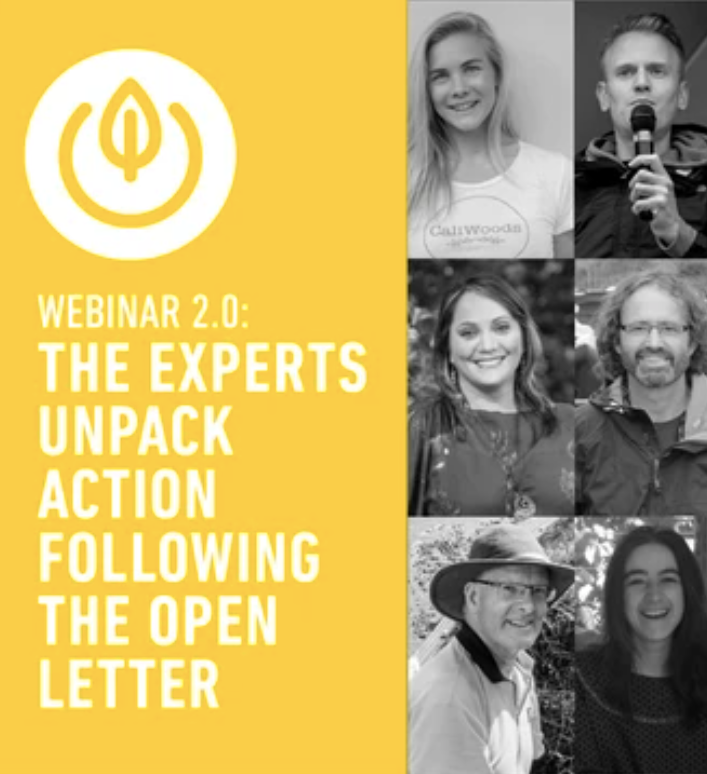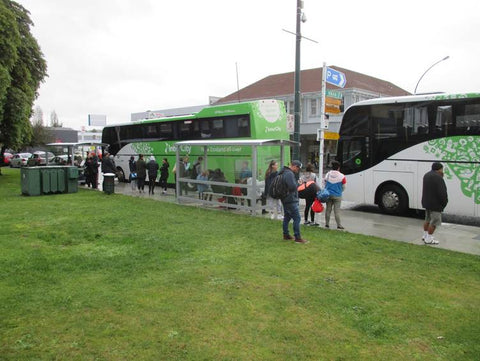Open Letter Action Guide

Webinar 2.0 recording and we have the text version below
Following the Open Letter we are committed to ensuring we actually see some, well, action. We have been hassling Ministers and Local Government by email and will be sure to keep you all updated as things unfold.
Another part of this action is giving everyone updates and specific tips on how we can all help... a people-powered movement for change! This is a summary of Webinar 2.0 with great next steps, direct from 5 leading sustainability experts. So dive in, enjoy, think and, when something resonates, ACT. We have added relevant links in to make it super easy for everyone.
The lockdown brought both light and shadow to our fine country when we look through a sustainability lens. Paul astutely pointed out that so many of us were on bikes, but now we aren't. Hannah mentioned how we thriftily made and mended things at home, but that our national recycling system collapsed. David noted that some of 'shovel-ready' projects that are part of the covid recovery could do more harm than good. Melanie figured that we still have change on our minds, but also agrees with Mike who pointed out that many things have apparently gone back to 'normal' but that normal is ecocide. Mike isn't afraid of strong words...or the truth.
With current context and our unrelenting need for positivity in mind, we thought it would be pretty handy to unpack some of the action needed. To go into the belly of that complex (yet strangely alluring) beast and see if we can find some next steps for Aotearoa New Zealand.
 Hannah Blumhardt getting excited about the Takeaway Throwaways campaign
Hannah Blumhardt getting excited about the Takeaway Throwaways campaign
ACTION GUIDE
Each expert was given roughly 4 minutes to speak their views on how New Zealand can help to save the world. What needs to change and how we can get there. No easy feat, but they are all champions and here's the gems of what they all suggested along with some links for you to follow up:
Hannah
Paul
Mike

Mel
David

More Actions
The above suggestions were from the Quickfire round. If you are after more details from the webinar then read on. Here's where you will find the gems...
Hannah's Actions:
Waste is a symptom of a broken system.There is so much waste, starting anywhere to reduce it is great. Focus energy on top of waste hierarchy which is the biggest bang for buck for reducing waste footprint and reduce greenhouse gases. Prevent and reduce waste in the first place, and reuse resources rather than fixating on recycling
Local & Individual:
- Take action to compost, worm farm or Bokashi bin your organic waste. Look at community based solutions if you can't do it yourself.
- Take the Plastic Free July pledge - Opt for reusables instead of just disposable glass and paper options remembering that plastic is not the only waste product.
- Put your money where your mouth is - shop locally where businesses are providing zero waste consumption solutions to stimulate local economies. Rubbish Trip shopping guide is super useful for every location around NZ.
- Reduce gadgets, clothes, appliances etc- repair broken and seek second hand through community groups, op shops and resource recovery centres.
- Be louder and more vocal, keep putting pressure on the government (see topic suggestions below).
- Sign petitions - right now you can be part of the Greenpeace banning plastic bottles petition as well as the one from Takeaway Throwaways to replace single use service wear with reusables.
Businesses:
- Consider how your business, or the one you work in, can further reduce dependence on single use items and foster reuse systems.
- Take a look at waste you pass on to customers, as well as up the supply chain.
- Collaboration, collaboration and collaboration - how can you work with other businesses like yours to help each other, share resources and knowledge?
- Reduce organic waste to landfill - compost, bokashi or worm farm. You don't have to do this yourself but rather be part of a community initiative or an organic waste pick up service.
- Shift away from single use service-wear and using reusables. The UYO Cafe Directory is a great place to start for hospitality.
- Redirect policy including investments and product stewardship schemes, towards waste prevention and reduction.
- Increase landfill levies for all landfills- currently fees of $10 per tonne only covers 11% of NZ's landfills. We have to price a linear economy if we want to turn towards a circular economy. Get behind supporting this - especially as a consideration to expand and increase the landfill levy is currently before Cabinet.
- Ethical procurement - 50% of waste to landfill is construction and demolition waste. Government must ensure that the shovel ready projects comply with existing sustainability standards to avoid this level of waste. We need all construction and demolition projects to comply with those standards.
Melanie's Actions:
- Vote and protest
- Learn - embrace books, webinars, conversations
- Understand that nature is not only nice to have, its a "have to have" for physical health and cognitive function. Physical health, cognitive and environment function ought to be measures of impact.
- Prioritise Māori participation, ensuring Māori are able to participate.
- Embrace Mātauranga Māori because it is a knowledge system that understands our environment.
- Commitment to train next generation to overcome unemployment rates.
- Plan to change education system. It is important to see a commitment of the next generation. Understand history, treaty rights and interests, where Māori are coming from.
- Treaty-based, mature conversation between partners. Wants to see a plan, united and inclusive manner that brings everyone along, directing and guiding agency and investment.
David's Actions:
- Vote in this election. What happens in this election will have great impact on climate policy.
- Get engaged with campaigning this election. Learn from examples of enviro campaigns overseas - where they have targeted members of parliaments in past elections. We risk loosing the green party from parliament - they are a critical voice for sustainability.
- Phone or in-person actions very important.
- Be careful about when you punch up or punch down. How are your asks affecting other people in the community.
- How can you look at the cohesion of grassroots movements and merge that into system change at business level?
- Target National members of parliament, be at their rallies and ask them how they are committing to climate and the environment.
- Be conscious of individual action vs mass political action. To change climate crisis we need to transform at a systemic scale. We can't do that by just individual action, so individual action must not be at expense of political action. e.g. individual vegan lifestyle can have huge impact, but all vegans must still make a stand for political action on multiple fronts.
Mike's Actions:
- Do something at the election coming up soon, be louder, protest more, speak up and "think local, do everything local"
- Immediate action can be directed towards the shovel ready projects like water infrastructure (storm water and wastewater). These are not "sexy" and don't get local votes, but they need doing and individuals can support this when voting,
- Encourage the use of Indigenous knowledge by the government and organisations. There is so much to be learnt and picked up on as a solution to climate crisis.
- Local communities ought to be part of a sustainable and resilient future, so putting pressure on government to do what we want them to do is important.
- Tell the Government to get away from GDP (gross domestic product) obsession. It was highlighted to individuals during COVID19 that there are far more important things than GDP, but does the government understand this?
- Tell the government to stop subsiding harmful practices like intensive farming and use of non-renewable resources. Subsides act as an open gate for harm, including fresh water pollution.
Paul's Actions:
- Follow Greater Auckland website which is a hub for better solutions in the transport industry. Auckland is a key place to reduce emissions as such a large percentage of the population lives there.
- Opt for electric cars, public transport and cycling.
Businesses:
- Make sure new car fleets are electric
- No more fossil fuel cars bought into the country, opt for electric transport options.
- Get trains going (e.g. Northern Explorer) and make pricing domestic pricing to increase accessibility and appeal...rather than just be available to tourists.
- Help support the provision of affordable high quality long distance buses. They are not a sexy form of travel, but they are a very low carbon means of travel and already link NZ towns together. Do no subsidise high carbon regional airlines
- Plan communities to encourage cycling, building cycle ways, and developing calm streets for safe travel.

- Tags: Business For Good
0 comments

